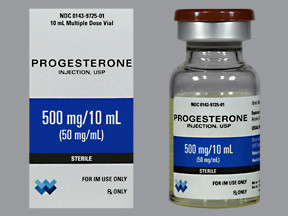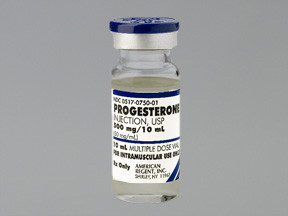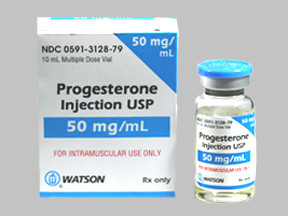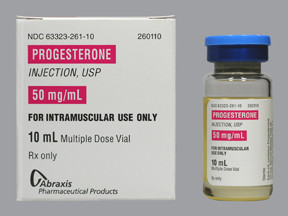PROGESTERONE - INTRAMUSCULAR
PHONETIC PRONUNCIATION: (pro-JESS-ter-own)
GENERIC NAME(S): progesterone
Uses
USES: Progesterone is a type of female hormone (progestin). This medication is similar to the progesterone that your body naturally makes. It is given to replace the hormone when your body is not making enough of it. In women who are not pregnant and have not gone through menopause, this medication is used to restore normal menstrual periods that have stopped for several months (amenorrhea). It is also used to treat abnormal bleeding from the uterus that is due to low hormone levels and not other causes (e.g., fibroids, cancer of the uterus). Progesterone must not be used to test for pregnancy. Progestins are not effective in preventing miscarriages.
How to use PROGESTERONE - INTRAMUSCULAR
HOW TO USE: Read the Patient Information Leaflet provided by your pharmacist before you start using progesterone and each time you get a refill. If you have any questions, consult your doctor or pharmacist. This medication is given by injection into a muscle as directed by your doctor, usually once daily. This medication is usually given for 6 to 8 days. Dosage is based on your medical condition and response to treatment. If you are giving this medication to yourself at home, learn all preparation and usage instructions from your health care professional. Before using, check this product visually for particles or discoloration. If either is present, do not use the liquid. Learn how to store and discard medical supplies safely. Before injecting each dose, the injection site should be cleaned with rubbing alcohol. It is important to change the location of the injection site daily to avoid problem areas in the muscle. Use this medication regularly to get the most benefit from it. To help you remember, use it at the same time each day. Tell your doctor if your condition persists or worsens.
Side Effects
Precautions
Interactions
Overdose
Images
Reviews
Faq for PROGESTERONE - INTRAMUSCULAR
Progesterone intramuscular injections are typically used to support pregnancy in women who have low levels of progesterone or have experienced previous miscarriages.
Progesterone intramuscular injections help maintain the lining of the uterus, which is essential for the successful implantation and growth of an embryo during pregnancy.
The frequency of progesterone intramuscular injections can vary depending on the individual's needs and the recommendation of the healthcare provider. It is usually given once daily or once every couple of days.
Common side effects of progesterone intramuscular injections may include pain or swelling at the injection site, dizziness, headache, breast tenderness, mood swings, and gastrointestinal disturbances. However, it is essential to discuss any concerns with a healthcare provider.
Typically, progesterone intramuscular injections are administered by a healthcare professional. However, in some cases, with proper training and guidance from a healthcare provider, individuals may be able to self-administer the injections at home.
The duration of progesterone intramuscular injections during pregnancy can vary depending on the individual's circumstances. In general, it is recommended to continue the injections until around week 12 to 14 of pregnancy when the placenta takes over progesterone production.
Progesterone intramuscular injections are mainly used to support pregnancy. However, in some cases, they may be prescribed for other medical conditions like hormonal imbalances or certain gynecological concerns. It is important to consult with a healthcare provider for personalized recommendations.
In addition to intramuscular injections, progesterone can also be administered in other forms such as vaginal suppositories, gel, or oral capsules. The choice of administration route depends on the individual's specific needs and medical advice.
Progesterone intramuscular injections are primarily used in women to support pregnancy. However, in some specific cases, healthcare providers may prescribe progesterone injections to men with certain hormonal disorders or medical conditions. It is always essential to consult with a healthcare professional for personalized guidance.
Disclaimer
IMPORTANT: HOW TO USE THIS INFORMATION: This is a summary and does NOT have all possible information about this product. This information does not assure that this product is safe, effective, or appropriate for you. This information is not individual medical advice and does not substitute for the advice of your health care professional. Always ask your health care professional for complete information about this product and your specific health needs.




No Reviews Yet